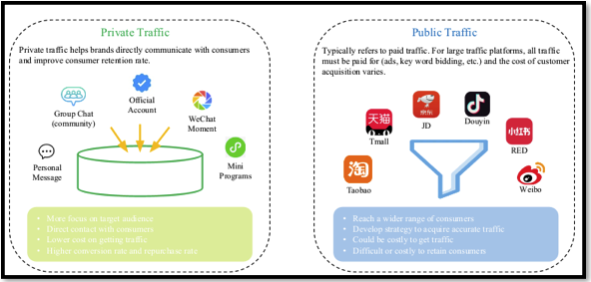Private Traffic China’s new marketing craze
What is Private traffic?
Simply put, it is the direct engagement of brands with end consumers, where brands can sell directly to their customer
without the actual involvement of traditional e-commerce(EC) platforms. Over the years, brands have spend massive
amounts of marketing dollars into traditional Chinese EC platforms just to grow the brand, these fees include ads, keyword
bidding, traffic etc. With the increasing difficulty and budget required to drive organic growth, "private traffic" helps brands
reduce cost of acquisition and build for more direct ROI. Let’s look at this chart below where it explains the main differences
between private and public traffic.
How does Private Traffic work?
To be concise, private traffic is acquainted with channelling customer communication into the controlled database managed by the
brand or business itself. This is typically done though WeChat, China’s number 1 messaging app.
In reference to Figure 1B, a group chat is simply formed by a brand and brands can engage with end consumers directly. The brands
can upload their product onto a mini-program link and share it directly with the group.
Figure 1B
Why Does Private Traffic Matter Now?
Private traffic is here to stay, it has grown by more than 1400% over the last 3 years and will continue to grow over the next
decade. Apart from its high volume of transactions, by nurturing a private traffic pool, brands can enjoy several key advantages:
The Power Of Private Traffic For Brands
Reduced Customer Acquisition Costs: Acquiring new clients on paid traffic may be overwhelmingly pricey. The economy of traffic
offered through private channels provides a cost-effective alternative by using present consumer relations, which is why the
network acquisition costs are kept at a low level. They will ultimately result in a high ROI.
Enhanced Customer Loyalty: The direct involvement of customers through private communications builds a deeper bond that makes
people more loyal than those who just have transactional interactions. This is especially important for brands who want to create unique
VIP experiences, enhancing customer relationships through a more personalized service approach, offering unique perks and
spending discount opportunities, will allow brands to build a dedicated customer base and promote brand loyalty.
Responsiveness and realism: As organizations grow, getting the right market feedback can prove to be tricky at times, research teams
are deployed, large budgets are thrown in and most times, not much is learnt. With private traffic, brands are directly in engagement with
the end consumer, this allows for direct market feedback. It also allows for sales teams to be swift and responsive to market changes
at a much lower cost.
Small brands, big impact
In many sense, this levels the playing field for brands across the board, big or small, smaller players who traditionally did not have
the budget to invest in EC can now leverage private traffic to push their brand forward. On the other hand, consumers are also more
exposed to new brands and have a newfound sense of discovery.
Consumer Willingness to Join Private Traffic Pools in China
Recent studies suggest that people are motivated to use private traffic channels because they give them access to different discounts,
featured products, and the most compelling content. Merchants can convert this "willingness" to acrophobia by offering rewards that
attract the target audience, leading to brand promotion and client base growth.
What does the future of private traffic hold?
Private traffic in China will continue to evolve as platforms like WeChat, Taobao, or Tmall accounts, and various social
media platforms (Weibo, Douyin, RED, JD, etc..) get more competitive with one another.
The dimensions in which one-to-one communication can be done will continue to enrich, this includes up-to-the-point
relevant audience involvement, and budget-friendly methods to attract and retain customers.
Does this mean that traditional EC models are dead?
Public traffic will remain and will always be an integral part of any marketing strategy. How brands split their budgets
between paid methods like advertising and keyword bidding on the major traffic platforms (e.g., search engines and
social networks) vs private traffic is going to be ever more important.
Brands need to bear in mind that public traffic does widen the audience, but at the same time, it could be expensive.
WeChat's private traffic on the other hand, for instance, offers a range of services, including group buying. The price
of goods decreases as more customers join the group, and community leaders' demonstrations of a good buying
experience influence the purchase. Private traffic is dedicated to delivering personalized communication, targeted
messaging, and a sense of belonging, all of which contribute to various conversions and improve customer retention.
Bottom Line
Over the years, brands have spent massive amounts of marketing dollars on traditional Chinese EC platforms just
to grow the brand, these fees include ads, keyword bidding, traffic etc. With the increasing difficulty and budget
required to drive organic growth, "private traffic" helps brands reduce cost of acquisition and build for more direct ROI.




